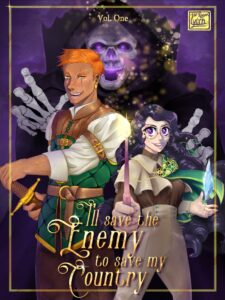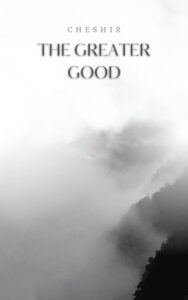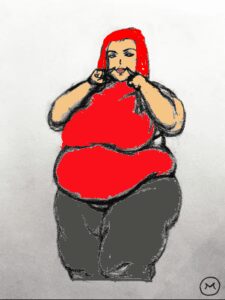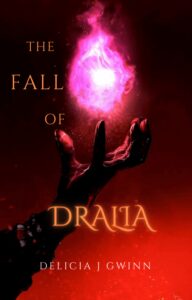While in England I began another poem, which I went on with during my journey home, and finished after my return. This was published under the name of Bhagna Hriday, The Broken Heart. At the time I thought it very good. There was nothing strange in the writer’s thinking so; but it did not fail to gain the appreciation of the readers of the time as well. I remember how, after it came out, the chief minister of the late Raja of Tipperah called on me solely to deliver the message that the Raja admired the poem and entertained high hopes of the writer’s future literary career.
About this poem of my eighteenth year let me set down here what I wrote in a letter when I was thirty:
When I began to write the Bhagna Hriday I was eighteen—neither in my childhood nor my youth. This borderland age is not illumined with the direct rays of Truth;—its reflection is seen here and there, and the rest is shadow. And like twilight shades its imaginings are long-drawn and vague, making the real world seem like a world of phantasy. The curious part of it is that not only was I eighteen, but everyone around me seemed to be eighteen likewise; and we all flitted about in the same baseless, substanceless world of imagination, where even the most intense joys and sorrows seemed like the joys and sorrows of dreamland. There being nothing real to weigh them against, the trivial did duty for the great.
This period of my life, from the age of fifteen or sixteen to twenty-two or twenty-three, was one of utter disorderliness.
When, in the early ages of the Earth, land and water had not yet distinctly separated, huge misshapen amphibious creatures walked the trunk-less forests growing on the oozing silt. Thus do the passions of the dim ages of the immature mind, as disproportionate and curiously shaped, haunt the unending shades of its trackless, nameless wildernesses. They know not themselves, nor the aim of their wanderings; and, because they do not, they are ever apt to imitate something else. So, at this age of unmeaning activity, when my undeveloped powers, unaware of and unequal to their object, were jostling each other for an outlet, each sought to assert superiority through exaggeration.
When milk-teeth are trying to push their way through, they work the infant into a fever. All this agitation finds no justification till the teeth are out and have begun assisting in the absorption of food. In the same way do our early passions torment the mind, like a malady, till they realise their true relationship with the outer world.
The lessons I learnt from my experiences at that stage are to be found in every moral text-book, but are not therefore to be despised. That which keeps our appetites confined within us, and checks their free access to the outside, poisons our life. Such is selfishness which refuses to give free play to our desires, and prevents them from reaching their real goal, and that is why it is always accompanied by festering untruths and extravagances. When our desires find unlimited freedom in good work they shake off their diseased condition and come back to their own nature;—that is their true end, there also is the joy of their being.
The condition of my immature mind which I have described was fostered both by the example and precept of the time, and I am not sure that the effects of these are not lingering on to the present day. Glancing back at the period of which I tell, it strikes me that we had gained more of stimulation than of nourishment out of English Literature. Our literary gods then were Shakespeare, Milton and Byron; and the quality in their work which stirred us most was strength of passion. In the social life of Englishmen passionate outbursts are kept severely in check, for which very reason, perhaps, they so dominate their literature, making its characteristic to be the working out of extravagantly vehement feelings to an inevitable conflagration. At least this uncontrolled excitement was what we learnt to look on as the quintessence of English literature.
In the impetuous declamation of English poetry by Akshay Chowdhury, our initiator into English literature, there was the wildness of intoxication. The frenzy of Romeo’s and Juliet’s love, the fury of King Lear’s impotent lamentation, the all-consuming fire of Othello’s jealousy, these were the things that roused us to enthusiastic admiration. Our restricted social life, our narrower field of activity, was hedged in with such monotonous uniformity that tempestuous feelings found no entrance;—all was as calm and quiet as could be. So our hearts naturally craved the life-bringing shock of the passionate emotion in English literature. Ours was not the æsthetic enjoyment of literary art, but the jubilant welcome by stagnation of a turbulent wave, even though it should stir up to the surface the slime of the bottom.
Shakespeare’s contemporary literature represents the war-dance of the day when the Renascence came to Europe in all the violence of its reaction against the severe curbing and cramping of the hearts of men. The examination of good and evil, beauty and ugliness, was not the main object,—man then seemed consumed with the anxiety to break through all barriers to the inmost sanctuary of his being, there to discover the ultimate image of his own violent desire. That is why in this literature we find such poignant, such exuberant, such unbridled expression.
The spirit of this bacchanalian revelry of Europe found entrance into our demurely well-behaved social world, woke us up, and made us lively. We were dazzled by the glow of unfettered life which fell upon our custom-smothered heart, pining for an opportunity to disclose itself.
There was another such day in English literature when the slow-measure of Pope’s common time gave place to the dance-rhythm of the French revolution. This had Byron for its poet. And the impetuosity of his passion also moved our veiled heart-bride in the seclusion of her corner.
In this wise did the excitement of the pursuit of English literature come to sway the heart of the youth of our time, and at mine the waves of this excitement kept beating from every side. The first awakening is the time for the play of energy, not its repression.
And yet our case was so different from that of Europe. There the excitability and impatience of bondage was a reflection from its history into its literature. Its expression was consistent with its feeling. The roaring of the storm was heard because a storm was really raging. The breeze therefrom that ruffled our little world sounded in reality but little above a murmur. Therein it failed to satisfy our minds, so that our attempts to imitate the blast of a hurricane led us easily into exaggeration,—a tendency which still persists and may not prove easy of cure.
And for this, the fact that in English literature the reticence of true art has not yet appeared, is responsible. Human emotion is only one of the ingredients of literature and not its end,—which is the beauty of perfect fulness consisting in simplicity and restraint. This is a proposition which English literature does not yet fully admit.
Our minds from infancy to old age are being moulded by this English literature alone. But other literatures of Europe, both classical and modern, of which the art-form shows the well-nourished development due to a systematic cultivation of self-control, are not subjects of our study; and so, as it seems to me, we are yet unable to arrive at a correct perception of the true aim and method of literary work.
Akshay Babu, who had made the passion in English literature living to us, was himself a votary of the emotional life. The importance of realising truth in the fulness of its perfection seemed less apparent to him than that of feeling it in the heart. He had no intellectual respect for religion, but songs of Shyāmā, the dark Mother, would bring tears to his eyes. He felt no call to search for ultimate reality; whatever moved his184 heart served him for the time as the truth, even obvious coarseness not proving a deterrent.
Atheism was the dominant note of the English prose writings then in vogue,—Bentham, Mill and Comte being favourite authors. Theirs was the reasoning in terms of which our youths argued. The age of Mill constitutes a natural epoch in English History. It represents a healthy reaction of the body politic; these destructive forces having been brought in, temporarily, to rid it of accumulated thought-rubbish. In our country we received these in the letter, but never sought to make practical use of them, employing them only as a stimulant to incite ourselves to moral revolt. Atheism was thus for us a mere intoxication.
For these reasons educated men then fell mainly into two classes. One class would be always thrusting themselves forward with unprovoked argumentation to cut to pieces all belief in God. Like the hunter whose hands itch, no sooner he spies a living creature on the top or at the foot of a tree, to kill it, whenever these came to learn of a harmless belief lurking anywhere in fancied security, they felt stirred up to sally forth and demolish it. We had for a short time a tutor of whom this was a pet diversion. Though I was a mere boy, even I could not escape his onslaughts. Not that his attainments were of any account, or that his opinions were the result of any enthusiastic search for the truth, being mostly gathered from others’ lips. But though I fought him with all my strength, unequally matched in age as we were, I suffered many a bitter defeat. Sometimes I felt so mortified I almost wanted to cry.
The other class consisted not of believers, but religious epicureans, who found comfort and solace in gathering together, and steeping themselves in pleasing sights, sounds and scents galore, under the garb of religious ceremonial; they luxuriated in the paraphernalia of worship. In neither of these classes was doubt or denial the outcome of the travail of their quest.
Though these religious aberrations pained me, I cannot say I was not at all influenced by them. With the intellectual impudence of budding youth this revolt also found a place. The religious services which were held in our family I would have nothing to do with, I had not accepted them for my own. I was busy blowing up a raging flame with the bellows of my emotions. It was only the worship of fire, the giving of oblations to increase its flame—with no other aim. And because my endeavour had no end in view it was measureless, always reaching beyond any assigned limit.
As with religion, so with my emotions, I felt no need for any underlying truth, my excitement being an end in itself. I call to mind some lines of a poet of that time:
My heart is mine I have sold it to none, Be it tattered and torn and worn away, My heart is mine!
From the standpoint of truth the heart need not worry itself so; for nothing compels it to wear itself to tatters. In truth sorrow is not desirable, but taken apart its pungency may appear savoury. This savour our poets often made much of; leaving out the god in whose worship they were indulging. This childishness our country has not yet succeeded in getting rid of. So even to-day, when we fail to see the truth of religion, we seek in its observance an artistic gratification. So, also, much of our patriotism is not service of the mother-land, but the luxury of bringing ourselves into a desirable attitude of mind toward the country.







Anarchism and Other Essays
Completed